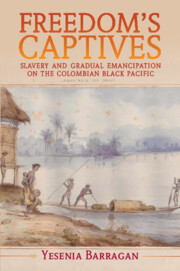Book contents
- Freedom’s Captives
- Afro-Latin America
- Freedom’s Captives
- Copyright page
- Dedication
- Epigraph
- Contents
- Figures
- Tables
- Acknowledgments
- Introduction
- Part I The Social Universe of the Colombian Black Pacific
- Part II The Time of Gradual Emancipation Rule
- 3 The Gradual Emancipation Law of 1821 and Abolitionist Publics in Colombia
- 4 The Children of the Free Womb and Technologies of Gradual Emancipation Rule
- 5 Routes to Freedom, Gradients of Unfreedom
- Part III Final Abolition and the Afterlife of Gradual Emancipation
- Epilogue
- Bibliography
- Index
4 - The Children of the Free Womb and Technologies of Gradual Emancipation Rule
from Part II - The Time of Gradual Emancipation Rule
Published online by Cambridge University Press: 18 June 2021
- Freedom’s Captives
- Afro-Latin America
- Freedom’s Captives
- Copyright page
- Dedication
- Epigraph
- Contents
- Figures
- Tables
- Acknowledgments
- Introduction
- Part I The Social Universe of the Colombian Black Pacific
- Part II The Time of Gradual Emancipation Rule
- 3 The Gradual Emancipation Law of 1821 and Abolitionist Publics in Colombia
- 4 The Children of the Free Womb and Technologies of Gradual Emancipation Rule
- 5 Routes to Freedom, Gradients of Unfreedom
- Part III Final Abolition and the Afterlife of Gradual Emancipation
- Epilogue
- Bibliography
- Index
Summary
Chapter 4 examines the legal, economic, and political life of the Free Womb law in the Colombian Pacific and the making of new racialized labor structures. For the first time, enslaved women were granted limited legal rights of maternity and motherhood over their children—at least those born after the promulgation of the 1821 law, which was at times malleably interpreted by lowland masters to defend their claims over Free Womb children. By carefully examining notes of sale, mining inventories, dowries, and wills, this chapter charts the formation in the northern Pacific lowlands of a parallel market for Free Womb children, which instantiated a new and at-times confusing regime of property rights. Reversals of the 1821 law are the subject of the chapter’s last section, which looks at extension of Free Womb bondage, partly inspired by the British Caribbean apprenticeship model established under the Slavery Abolition Act of 1833, in the aftermath of Colombia’s first civil war (1839–1842).
Keywords
- Type
- Chapter
- Information
- Freedom's CaptivesSlavery and Gradual Emancipation on the Colombian Black Pacific, pp. 159 - 198Publisher: Cambridge University PressPrint publication year: 2021

